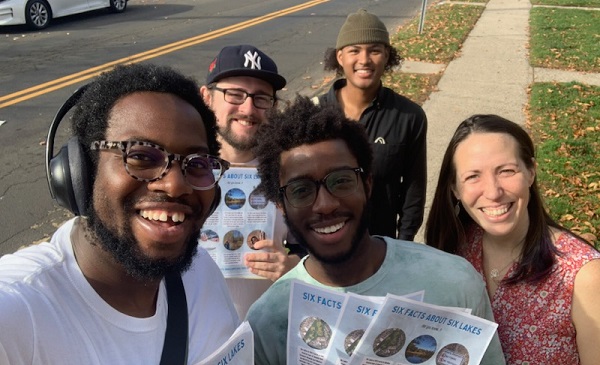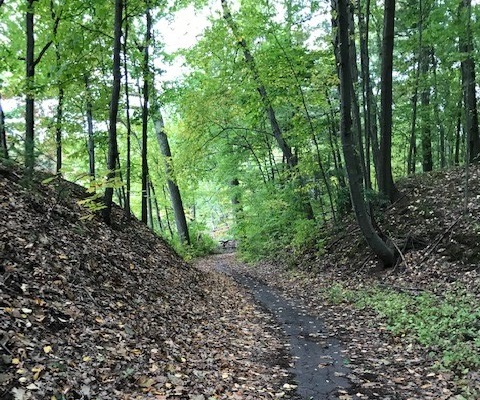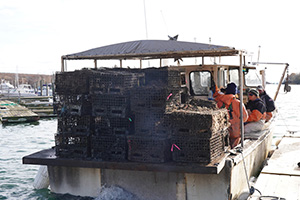
Six Lakes, One Vision: Resolution passes Hamden Legislative Council
Most people who live in Hamden, Connecticut haven’t seen the wide paths that meander through an old-growth forest or the placid ponds that are home to ducks and swans at Six Lakes. Many aren’t even aware that this 102-acre parcel exists, hidden in plain sight between two of the town’s busiest commercial roadways. That’s because the Six Lakes area, known for decades as Olin Powder Farm, is a former industrial site once used for gunpowder storage and munitions testing, and later as a dumping ground for battery waste, solvents, and other materials. Its polluted past makes it a public hazard, and a chain link fence blocks entry even to those who know it’s there.
Now, a resolution passed unanimously by the Hamden Legislative Council last Monday night may be the juice needed to jump start a cleanup by Olin Corporation that the CT Department of Energy and Environmental Protection ordered back in 1986. The corporation started the work, but it was never completed. The ultimate goal: creation of a public park at Six Lakes. The town document resolves that “the Hamden Legislative Council shall support the environmental remediation and the conversion of the former Olin Powder Farm site to public access and public use as envisioned by the people of Southern Hamden.” Read the draft resolution here.
Southern Hamden—particularly the Newhall neighborhood—takes center stage in the Six Lakes project because its fate has been closely tied to the property for nearly a century. Many of Newhall’s predominantly Black, working class residents first arrived during the Great Migration to work in the nearby Winchester Repeating Arms Company factory; Winchester was later purchased by Olin. Both Winchester and the Town of Hamden had filled Six Lakes’ marshes with industrial and municipal waste over the course of decades before Newhall’s grid of modest single-family homes was developed. Thanks to the advocacy of community leaders, the neighborhood underwent a large-scale environmental cleanup in the early 2000s. But the emotional legacy of contamination lingers today, and numerous homes still suffer from unremediated damage.

Last week’s resolution is a promising step forward, signaling the town’s interest in and support for the project. Newhall representatives are among the members of a broad coalition of Six Lakes neighbors, elected officials, religious and civic leaders, land trusts, and environmental organizations including Save the Sound, advocating for Six Lakes to become a park and nature preserve welcoming to all. And DEEP is directing its attention to holding Olin accountable for the long overdue remediation of the site. Learn how you can support this growing movement by signing up for alerts on the Six Lakes website: https://www.6lakes.org/contact-join-us
We’re Speaking Up for River Herring
There are 400,000 reasons you should be worried about river herring today.
That’s about how many fewer alewife, a species of river herring, showed up than expected in fish runs in Connecticut rivers and streams in 2022.
A peer-reviewed paper published in November identified that many of Connecticut’s river herring are ending up as bycatch in open-water fishing for Atlantic herring and mackerel. It’s a huge problem, one that deserves to be included on the New England Fisheries Management Council’s list of priority issues when it votes on Thursday to determine its 2023 agenda.
Long Island Soundkeeper Bill Lucey will testify at a public hearing on Tuesday, and letters have been submitted by coalitions of organizations leading conservation efforts for fisheries in Connecticut, all with the goal of ensuring the river herring issue is on the NEFMC agenda.
Save the Sound, NRDC, and Riverkeeper Urge Stronger, Health-Protecting Standards for NYC Waters
Last Monday, Save the Sound, Riverkeeper, and Natural Resources Defense Council submitted comments through the Pace Environmental Litigation Clinic to the New York State Department of Environmental Conservation urging the agency to set new water quality standards for the coastal waters in and around New York City to make them healthier for recreation and restore ecological functions.
In 2017, these partners filed a federal lawsuit to compel EPA to adopt health-protective standards that override the DEC’s. The pressure of that pending lawsuit compelled the DEC to open a comment period and consider new water quality standards.
“We are gratified they have started a process, but we will be vigilant to ensure it is done right,” said our senior legal counsel, Roger Reynolds. “The water quality standards will directly impact how quickly and thoroughly New York City will have to act to eliminate its more than 20 billion gallons of sewage overflows that constitute an ongoing environmental justice catastrophe and imperil the health of New York City swimmers and boaters.”
Thanks to all of you who submitted data on your uses of NYC’s coastal waters to the interactive map.Together we document 280,000+ distinct uses, including kayaking, shell-fishing, and swimming.
The Haul-day Season

With partners aboard from our Soundkeeper team, The Maritime Aquarium, and Project Oceanology, the boat was crowded to begin with. It was positively packed on the trip home, thanks to the day’s haul: 48 lost lobster traps, reclaimed from Long Island Sound off Bridgeport, CT, in just four hours.
The trip last Tuesday was part of the Long Island Sound Lobster Trap Removal and Assessment Partnership, the goal of which is to locate and remove thousands of “ghost” traps, some of which have been fishing silently on the Sound floor since the lobster population plummeted in the 1990s.
“Many traps were left behind and can pose a nuisance to boaters and fisherman in the Sound,” said Soundkeeper associate Emma DeLoughry. “Abandoned traps that are still functioning are also harmful as they continue to capture sea life.” Trapped species recorded last week included black sea bass, tautog, rock crabs, whelk, and sea urchins.
The team expects to make three more trips before the end of December.
Sharing Skills and Successes at a National Summit
Restore America’s Estuaries is hosting their annual summit this week. The conference brings together over 1,000 coastal restoration professionals, policy makers, and regulators to New Orleans to discuss all things estuarine and riverine. NOAA and the U.S. Army Corps of Engineers are hosting workshops that will develop nature-based solutions to current coastal issues and provide training on integrating diversity, equity, inclusion, and justice into coastal resilience projects. Save the Sound President Leah Lopez Schmalz, Regional Director of Ecological Restoration Laura Wildman, Regional Director of Water Protection David Ansel, and more staff are there, connecting with other experts to hear the latest innovations in the field and share our successes restoring our own local estuary. Stay tuned to hear about their experiences!
Quick Links
• “Initial Funding for Dam Removal on Blind Brook,” MyRye.com – A big step for our river restoration project at Rye High School, and partnership with student Delia!
• “Parts of Long Island Sound have improved due to wastewater management,” WSHU
• “Report: Eastern Long Island Sound healthy despite concerns over rising water temperatures,” Suffolk Times
• “Governor Hochul Announces $2.25 Million in Federal Funding to Improve Long Island Water Quality and Reduce Pollution,” LongIsland.com
• “Eversource – Ørsted Partner with Mystic Aquarium to Study Effects of Offshore Wind on Marine Mammals,” CT Examiner – with thoughts from Soundkeeper Bill
• A terrific conversation between current and future leaders – Future Frogmen and NOAA marine debris program staff talk with 11th grade science students at the Grauer School
Upcoming Events
Connecticut Equity and Environmental Justice Advisory Council (CEEJAC) quarterly meeting, Dec. 14.
Eelgrass Restoration Project Update webinar, Thursday, Dec. 8 at 6:00 PM
More coming soon—get registration links and all the details on our Stay Engaged page!
